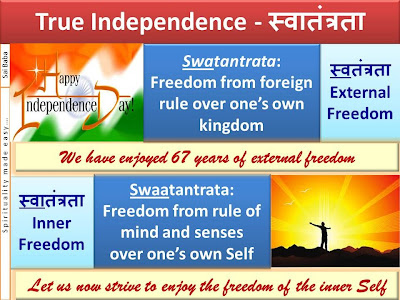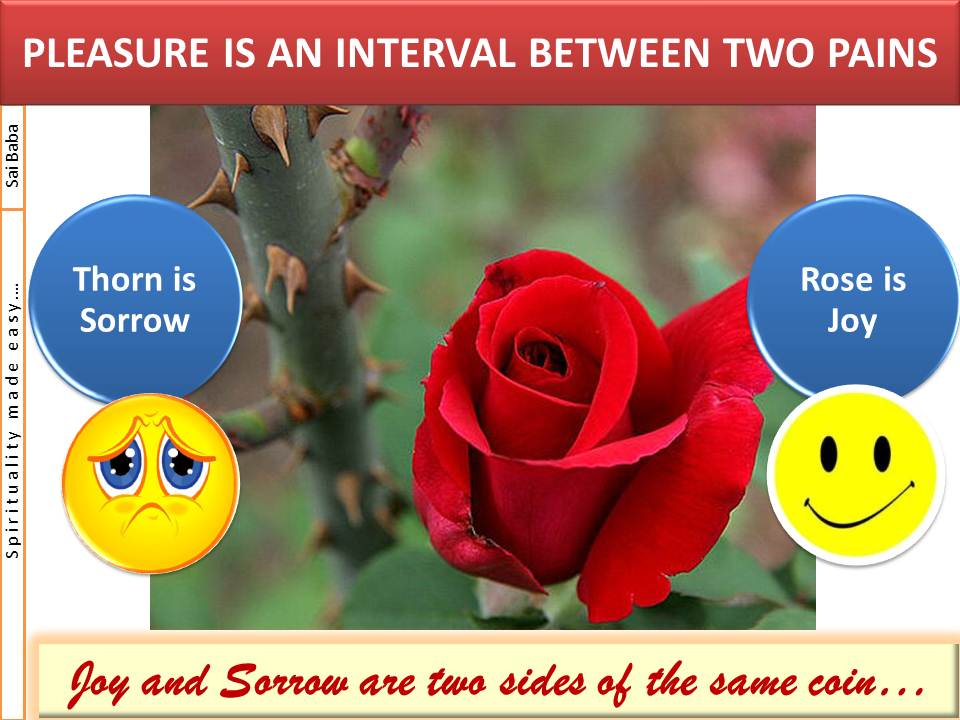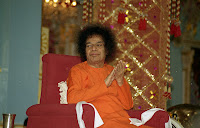This section of the blog presents well known quotes of Bhagawan Baba, filled with profound wisdom and yet so simple in its presentation. The huge banyan tree lies unmanifest in a small seed. So too the eternal wisdom lies pregnant in these quotes of Bhagawan. Read, hear, introspect and assimilate the wisdom in these quotes.
Today there is no Atma Balam (Atmic strength). One’s Self-confidence is subject to bumps and jumps every second to second. There is no steadiness at all. If one’s desires are fulfilled, they keep 10 photos (of God) in the place of one. If, on the other hand, one’s wishes are not fulfilled, they remove even the photos that are currently there. This is not true steadiness. You may worship the picture as a God, but not God as a picture. If we keep changing our feelings like this from every second to second, how can our life gain any steadiness? Whatever losses, difficulties, sorrows or worries we may come across; we must face them courageously and make an effort to overcome them.
Spiritual Arithmetic-3-1=1 – 1.15-1996 September 08
Here there are three – you, your image and the mirror. O fool, remove the mirror and the image too is gone. Only one is left (the object).
Sarva Jeeva Namaskaaram Keshavam Pratigachathi-1985 August 15
None should have hatred towards any other person. The reason for this is that if you hate anybody it will amount to you hating your God. Therefore, it is said in the Upanishads, “Sarva Jeeva Namaskaaram Keshavam Pratigachchati”. It means that to whomsoever we salute or pay obeisance, it is equivalent to saluting or paying our obeisance to Keshava (God). In the same way, “Sarva Jeeva Tiraskaaram Keshavam Pratigachchati”. If you abuse or criticize anybody, that also reaches God. When one criticizes others, and that itself reaches God, what would be one’s fate if he/she were to directly criticize God? Thus, we must not hate anybody. It is said in the Bhagavad Gita, “Adveshta Sarva Bhootaanaam” – we should not hate anybody.
True unity is unity with God-2.07-1985 August 15
Worldly unity is only about “Hello, hello, hello, hello”. Is this unity? When there is money in the pocket, when your father’s position is very good, when everything is fine, all will come to you saying “hello, hello”. When the money is gone and the position is gone, there will not be anyone in the world to even say goodbye to you. So long as there is water in the tank, there will be thousands of frogs over there. Once the water dries up, there will not even be one frog over there. Therefore, unity related to the world is all based on money, money and money. Money makes many things, money makes many wrongs. With respect to God, it is “Mann” (mind) and with respect to the world it is money. We must seek unity through the mind. Mind to mind, heart to heart, love to love; not body to body.
W A T C H-1.28-2002 November 20
I tell many students, the spelling of watch is W A T C H. We must advise the students thus – what is this? This is a W A T C H. The first letter is “W” – Watch your Word. You must watch whether you are using sacred words or bad words. The second letter is “A” – Watch your Action. The third letter is “T” – watch your Thought. The fourth letter is “C” – Watch your Character. “H” – Watch your Heart. This the true watch. When we talk of watch, we look at our wrist watch. That is not the real watch. The wrist watch may get spoiled, but this word “W A T C H” will never get spoiled. It will always bestow sacredness on you.
Pleasure is an interval between two pains-2.24-1985 August 15
In-Dependence-1.00-1985 August 15
What is the meaning of the word “Independence”? Dependence means being under the control of others. Not just other people but being under the control of anything is dependence. Therefore, “Dependence” is being under the control of anyone or anything and “Independence” is not being under the control of anybody or anything. Thus we must not be “dependent”; we must be “in-dependent”. This is what is called Swaatantram.
Swatantrata and Swaatantrata-2.46-1985 August 15
Since God is both inside and outside, we must experience freedom both internally and externally. Antar Bahischa Tatsarvam Vyaapya Naarayanaha. The same God is present both inside and outside. Therefore, when man truly wishes to attain freedom, he must recognize the control of senses, truth of God, and broadmindedness of man.
Richest person and poorest person-2.14-1998 April 26
Receiving from God is the path of richness, but receiving from the world is the path of poorness. Once Lord Buddha questioned within himself as to who was the richest man in this world; his father or the kings? No, this is a great mistake. He who has much satisfaction is the richest man. Who is the poorest man? He who has many desires is the poorest man. Therefore, when we reduce these desires gradually, we gain the right to receive the love of God. We need to reduce this selfish love. We need to reduce our desires gradually.
Smarana and Anusmarana-1.06-1998 April 26
You feel that you are thinking of Me constantly. Maam Anusmarana Cha – you are doing Smaranabut not Anusmarana. Smarana or contemplation is bound by a particular time, discipline and place. But Anusmaranais Sarvada Sarva Kaaleshu Sarvatra Harichintanam – contemplation of God always, at all times and everywhere. You will be able to recognize My Divinity only when you practice and experience Anusmarana. Then, these worldly problems will not affect you anymore.
Mother is God-Father is God-0.45-2003 April 15
We need to respect the elders. First we need to salute God – Adi Devo Bhava. Then we need to salute our friends, our mother and our Guru. Matru Devo Bhava (Mother is God), Pitru Devo Bhava (Father is God), Aacharya Devo Bhava (Preceptor is God), Athiti Devo Bhava (Guest is God). If you respect all of them today (now), others will respect you tomorrow (later). If you do not give respect today, later other fellow beings will not respect you. Give respect and take respect.
Speak always obligingly-0.18-2000 August 22
To start with man must exercise control over his ten senses. The words that come forth from the mouth must be sacred. You cannot always oblige, but you can speak always obligingly. Utter your words peacefully. Do not use harsh words.
The 4 Fs-Follow the Master-1.08-1998 April 26
God is not different from us at all. God is shining brilliantly in all as the Atma Swaroopa (the Self). This is called the conscience. Therefore, you must follow your conscience. This is what I tell the students often – the 4Fs: F-F-F-F
Follow the Master. Who is your Master? Your God is your Master. That is, your conscience is your Master. Therefore, follow your conscience. Face the devil. Who do you think is the devil? It is all the wealth. Do not have excessive desire for wealth. Throw out this desire. Next, the third F. Fight to the end. Finish the game. That is Mukti (liberation).
Shradhaavaan Labhate Jnaanam Sanshayaatma Vinashyate-0.43-1990 May 26
On one side is the eight lettered mantra – Shra-ddha-vaan-La-bha-the-Jnaa-nam(Shraddhavaan Labhathe Jnaanam: the man of faith acquires supreme wisdom). On the other side is the eight lettered mantra – Sam-shay-Aat-ma-Vi-nash-ya-te(Samshayaatma Vinashyathi: the one filled with doubts will perish). Human life can reach its goal only when there is Shraddha (faith) on one side and Nisamshayam (doubtlessness) on the other side.
You are the Master-rest are all instruments-0.19-1997 July 18
You are the Master. Body, mind, senses are all instruments. You are here to make use of these instruments. Make good use of these instruments.
Vishwaasa must be our Shwaasa-0.09-1997 July 18
Today we must develop faith. Faith must be our very life breath!
Self-confidence-Self-realization-Foundation-Building-0.15-1997 July 18
Self-confidence is the first – it is the foundation. Self-satisfaction is the walls. Self-sacrifice is the roof. Self-realization is life.
You are not one but three-0.28-1997 July 18






















